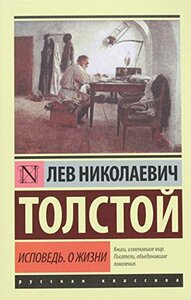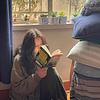You need to sign in or sign up before continuing.
Take a photo of a barcode or cover
dark
reflective
sad
medium-paced
A reflection on the author's life and his search for meaning. It was somewhat ironic when Tolstoy talked about looking into the past, into the 'sages' wisdom' to find the answer to his crisis, only to be disappointed; that was exactly what I was doing reading this book. Obviously, it's silly to expect the meaning of life to be in one Russian autobiography but I have to admit, he lost me when his eventual conclusion was "God."
It felt like he was simply inventing a definition for God that would satisfy him - because he, as detailed in multiple chapters, couldn't accept the inherent unreasonableness of religion - because he had no other answers to life's biggest questions. Kind of a cop-out, but whatever floats your boat, man.
It felt like he was simply inventing a definition for God that would satisfy him - because he, as detailed in multiple chapters, couldn't accept the inherent unreasonableness of religion - because he had no other answers to life's biggest questions. Kind of a cop-out, but whatever floats your boat, man.
Moderate: Suicide
mysterious
reflective
slow-paced
emotional
reflective
slow-paced
challenging
reflective
medium-paced
reflective
slow-paced
It made me question a lot without actually giving me the answers. Feels weird giving a star rating to such a deeply personal essay but it is very well deserved.
Kind of blue balled us by leaving out his beliefs at the end there and just ripping out a sick dream metaphor but go off I guess
challenging
dark
informative
tense
medium-paced
🍃“𝑰 𝒘𝒂𝒔 𝒂𝒇𝒓𝒂𝒊𝒅 𝒐𝒇 𝒍𝒊𝒇𝒆 𝒂𝒏𝒅 𝒔𝒕𝒓𝒐𝒗𝒆 𝒂𝒈𝒂𝒊𝒏𝒔𝒕 𝒊𝒕, 𝒚𝒆𝒕 𝑰 𝒔𝒕𝒊𝒍𝒍 𝒉𝒐𝒑𝒆𝒅 𝒇𝒐𝒓 𝒔𝒐𝒎𝒆𝒕𝒉𝒊𝒏𝒈 𝒇𝒓𝒐𝒎 𝒊𝒕.”
A confession by Leo Tolstoy deals with the idea of philosophy, religion and atheism. The book is also an autobiographical account of the author's own struggle with these issues.
Leo Tolstoy asks himself the question about meaning of life and fails to answer it thus turns to various ideologies to find the answer. He finds a sort of comfort in atheism and philosophy but still his question remains unanswered and he finds himself in despair wanting to kill himself. And when he's on the verge of suicide he finally finds the answer of his questions:
“𝑻𝒐 𝒌𝒏𝒐𝒘 𝑮𝒐𝒅 𝒂𝒏𝒅 𝒕𝒐 𝒍𝒊𝒗𝒆 𝒂𝒓𝒆 𝒐𝒏𝒆 𝒂𝒏𝒅 𝒕𝒉𝒆 𝒔𝒂𝒎𝒆 𝒕𝒉𝒊𝒏𝒈. 𝑮𝒐𝒅 𝒊𝒔 𝒍𝒊𝒇𝒆.”
Tolstoy in the beginning tries philosophy to explain the meaning of life and he realises that life is evil, and we eventually have to die and he realises how meaningless life is in that case. He quotes Socrates, Schopenhauer and Solomon:
“𝑾𝒆 𝒈𝒓𝒐𝒘 𝒄𝒍𝒐𝒔𝒆𝒓 𝒕𝒐 𝒕𝒉𝒆 𝒕𝒓𝒖𝒕𝒉 𝒐𝒏𝒍𝒚 𝒕𝒐 𝒕𝒉𝒆 𝒆𝒙𝒕𝒆𝒏𝒕 𝒕𝒉𝒂𝒕 𝒘𝒆 𝒈𝒓𝒐𝒘 𝒇𝒖𝒓𝒕𝒉𝒆𝒓 𝒂𝒘𝒂𝒚 𝒇𝒓𝒐𝒎 𝒍𝒊𝒇𝒆,’ 𝒔𝒂𝒚𝒔 𝑺𝒐𝒄𝒓𝒂𝒕𝒆𝒔.”
“𝑬𝒗𝒆𝒓𝒚𝒕𝒉𝒊𝒏𝒈 𝒊𝒏 𝒕𝒉𝒆 𝒘𝒐𝒓𝒍𝒅, 𝒃𝒐𝒕𝒉 𝒇𝒐𝒍𝒍𝒚 𝒂𝒏𝒅 𝒘𝒊𝒔𝒅𝒐𝒎, 𝒓𝒊𝒄𝒉𝒏𝒆𝒔𝒔 𝒂𝒏𝒅 𝒑𝒐𝒗𝒆𝒓𝒕𝒚, 𝒉𝒂𝒑𝒑𝒊𝒏𝒆𝒔𝒔 𝒂𝒏𝒅 𝒈𝒓𝒊𝒆𝒇, 𝒂𝒍𝒍 𝒊𝒔 𝒗𝒂𝒏𝒊𝒕𝒚 𝒂𝒏𝒅 𝒆𝒎𝒑𝒕𝒊𝒏𝒆𝒔𝒔. 𝑨 𝒎𝒂𝒏 𝒅𝒊𝒆𝒔 𝒂𝒏𝒅 𝒏𝒐𝒕𝒉𝒊𝒏𝒈 𝒓𝒆𝒎𝒂𝒊𝒏𝒔. 𝑻𝒉𝒊𝒔 𝒊𝒔 𝒂𝒃𝒔𝒖𝒓𝒅,’ 𝒔𝒂𝒚𝒔 𝑺𝒐𝒍𝒐𝒎𝒐𝒏. ”
“𝑳𝒊𝒇𝒆 𝒊𝒔 𝒕𝒉𝒂𝒕 𝒘𝒉𝒊𝒄𝒉 𝒊𝒕 𝒔𝒉𝒐𝒖𝒍𝒅 𝒏𝒐𝒕 𝒃𝒆: 𝒆𝒗𝒊𝒍. 𝑻𝒉𝒆 𝒕𝒓𝒂𝒏𝒔𝒊𝒕𝒊𝒐𝒏 𝒊𝒏𝒕𝒐 𝒏𝒐𝒕𝒉𝒊𝒏𝒈𝒏𝒆𝒔𝒔 𝒊𝒔 𝒕𝒉𝒆 𝒐𝒏𝒍𝒚 𝒕𝒉𝒊𝒏𝒈 𝒔𝒂𝒄𝒓𝒆𝒅 𝒊𝒏 𝒍𝒊𝒇𝒆,’ 𝒔𝒂𝒚𝒔 𝑺𝒄𝒉𝒐𝒑𝒆𝒏𝒉𝒂𝒖𝒆𝒓. ”
And he realises :
“𝒕𝒉𝒆 𝒎𝒆𝒂𝒏𝒊𝒏𝒈𝒍𝒆𝒔𝒔𝒏𝒆𝒔𝒔 𝒐𝒇 𝒍𝒊𝒇𝒆 𝒂𝒔 𝒕𝒉𝒆 𝒐𝒏𝒍𝒚 𝒊𝒏𝒅𝒊𝒔𝒑𝒖𝒕𝒂𝒃𝒍𝒆 𝒑𝒊𝒆𝒄𝒆 𝒐𝒇 𝒌𝒏𝒐𝒘𝒍𝒆𝒅𝒈𝒆 𝒂𝒗𝒂𝒊𝒍𝒂𝒃𝒍𝒆 𝒕𝒐 𝒎𝒂𝒏.”
He uses the fable of dragon in the well : a man who is chased by a beast into a well, at the bottom of which is a dragon.The man clings to a branch and licks honey from it while the branch is being eaten by two mice. The mice represent the time which is taking him closer to death and the honey represents the comforts of life. But once a man is aware of the mice an the bottom(death), he can no longer enjoy the honey(life). Based on this Tolstoy classifies people into 4 categories:
1.The ignorant people, these people are ignorant of the mice and the dragon at bottom and continue to live without consciousness of impeding doom.
"𝘛𝘩𝘦 𝘧𝘪𝘳𝘴𝘵 𝘮𝘦𝘵𝘩𝘰𝘥 𝘰𝘧 𝘦𝘴𝘤𝘢𝘱𝘦 𝘪𝘴 𝘵𝘩𝘢𝘵 𝘰𝘧 𝘪𝘨𝘯𝘰𝘳𝘢𝘯𝘤𝘦. 𝘐𝘵 𝘤𝘰𝘯𝘴𝘪𝘴𝘵𝘴 𝘰𝘧 𝘧𝘢𝘪𝘭𝘪𝘯𝘨 𝘵𝘰 𝘳𝘦𝘤𝘰𝘨𝘯𝘪𝘻𝘦, 𝘰𝘳 𝘶𝘯𝘥𝘦𝘳𝘴𝘵𝘢𝘯𝘥, 𝘵𝘩𝘢𝘵 𝘭𝘪𝘧𝘦 𝘪𝘴 𝘦𝘷𝘪𝘭 𝘢𝘯𝘥 𝘢𝘣𝘴𝘶𝘳𝘥"
2. The epicurean people: these people are aware of the fact that death is approaching them but choose to ignore it and live the life with what nature has provided them.
"𝘛𝘩𝘦 𝘴𝘦𝘤𝘰𝘯𝘥 𝘮𝘦𝘵𝘩𝘰𝘥 𝘰𝘧 𝘦𝘴𝘤𝘢𝘱𝘦 𝘪𝘴 𝘵𝘩𝘢𝘵 𝘰𝘧 𝘦𝘱𝘪𝘤𝘶𝘳𝘦𝘢𝘯𝘪𝘴𝘮. 𝘐𝘵 𝘤𝘰𝘯𝘴𝘪𝘴𝘵𝘴, 𝘸𝘩𝘪𝘭𝘦 𝘬𝘯𝘰𝘸𝘪𝘯𝘨 𝘵𝘩𝘦 𝘩𝘰𝘱𝘦𝘭𝘦𝘴𝘴𝘯𝘦𝘴𝘴 𝘰𝘧 𝘭𝘪𝘧𝘦, 𝘰𝘧 𝘦𝘯𝘫𝘰𝘺𝘪𝘯𝘨 𝘵𝘩𝘦 𝘣𝘭𝘦𝘴𝘴𝘪𝘯𝘨𝘴 𝘸𝘦 𝘩𝘢𝘷𝘦 𝘸𝘪𝘵𝘩𝘰𝘶𝘵 𝘭𝘰𝘰𝘬𝘪𝘯𝘨 𝘢𝘵 𝘵𝘩𝘦 𝘥𝘳𝘢𝘨𝘰𝘯 𝘰𝘳 𝘵𝘩𝘦 𝘮𝘪𝘤𝘦, 𝘢𝘯𝘥 𝘰𝘧 𝘭𝘪𝘤𝘬𝘪𝘯𝘨 𝘵𝘩𝘦 𝘩𝘰𝘯𝘦𝘺 𝘪𝘯 𝘵𝘩𝘦 𝘣𝘦𝘴𝘵 𝘱𝘰𝘴𝘴𝘪𝘣𝘭𝘦 𝘸𝘢𝘺, 𝘦𝘴𝘱𝘦𝘤𝘪𝘢𝘭𝘭𝘺 𝘪𝘧 𝘢 𝘭𝘰𝘵 𝘰𝘧 𝘪𝘵 𝘩𝘢𝘴 𝘧𝘢𝘭𝘭𝘦𝘯 𝘰𝘯 𝘵𝘩𝘦 𝘣𝘶𝘴𝘩."
3. The strong and brave people: these are the people aware of the death and meaninglessness of life and simply choose to end it by committing suicide.
"𝘛𝘩𝘦 𝘵𝘩𝘪𝘳𝘥 𝘮𝘦𝘵𝘩𝘰𝘥 𝘰𝘧 𝘦𝘴𝘤𝘢𝘱𝘦 𝘪𝘴 𝘵𝘩𝘳𝘰𝘶𝘨𝘩 𝘴𝘵𝘳𝘦𝘯𝘨𝘵𝘩 𝘢𝘯𝘥 𝘦𝘯𝘦𝘳𝘨𝘺. 𝘐𝘵 𝘤𝘰𝘯𝘴𝘪𝘴𝘵𝘴 𝘰𝘧 𝘳𝘦𝘢𝘭𝘪𝘻𝘪𝘯𝘨 𝘵𝘩𝘢𝘵 𝘭𝘪𝘧𝘦 𝘪𝘴 𝘦𝘷𝘪𝘭 𝘢𝘯𝘥 𝘴𝘦𝘯𝘴𝘦𝘭𝘦𝘴𝘴, 𝘢𝘯𝘥 𝘰𝘧 𝘥𝘦𝘴𝘵𝘳𝘰𝘺𝘪𝘯𝘨 𝘪𝘵."
4. The weak: These are the people who are helpless, completely aware of the absurdity of life and despite it choosing to live in the state of despair.
"𝘛𝘩𝘦 𝘧𝘰𝘶𝘳𝘵𝘩 𝘳𝘰𝘢𝘥 𝘰𝘧 𝘦𝘴𝘤𝘢𝘱𝘦 𝘪𝘴 𝘵𝘩𝘢𝘵 𝘰𝘧 𝘸𝘦𝘢𝘬𝘯𝘦𝘴𝘴. 𝘐𝘵 𝘤𝘰𝘯𝘴𝘪𝘴𝘵𝘴 𝘰𝘧 𝘤𝘭𝘪𝘯𝘨𝘪𝘯𝘨 𝘵𝘰 𝘢 𝘭𝘪𝘧𝘦 𝘵𝘩𝘢𝘵 𝘪𝘴 𝘦𝘷𝘪𝘭 𝘢𝘯𝘥 𝘧𝘶𝘵𝘪𝘭𝘦, 𝘬𝘯𝘰𝘸𝘪𝘯𝘨 𝘪𝘯 𝘢𝘥𝘷𝘢𝘯𝘤𝘦 𝘵𝘩𝘢𝘵 𝘯𝘰𝘵𝘩𝘪𝘯𝘨 𝘤𝘢𝘯 𝘤𝘰𝘮𝘦 𝘰𝘧 𝘪𝘵. 𝘗𝘦𝘰𝘱𝘭𝘦 𝘣𝘦𝘭𝘰𝘯𝘨𝘪𝘯𝘨 𝘵𝘰 𝘵𝘩𝘪𝘴 𝘤𝘢𝘵𝘦𝘨𝘰𝘳𝘺 𝘬𝘯𝘰𝘸 𝘵𝘩𝘢𝘵 𝘥𝘦𝘢𝘵𝘩 𝘪𝘴 𝘱𝘳𝘦𝘧𝘦𝘳𝘢𝘣𝘭𝘦 𝘵𝘰 𝘭𝘪𝘧𝘦 𝘣𝘶𝘵, 𝘭𝘢𝘤𝘬𝘪𝘯𝘨 𝘵𝘩𝘦 𝘴𝘵𝘳𝘦𝘯𝘨𝘵𝘩 𝘵𝘰 𝘢𝘤𝘵 𝘳𝘢𝘵𝘪𝘰𝘯𝘢𝘭𝘭𝘺 𝘢𝘯𝘥 𝘣𝘳𝘪𝘯𝘨 𝘢 𝘲𝘶𝘪𝘤𝘬 𝘦𝘯𝘥 𝘵𝘰 𝘵𝘩𝘦 𝘥𝘦𝘤𝘦𝘱𝘵𝘪𝘰𝘯 𝘣𝘺 𝘬𝘪𝘭𝘭𝘪𝘯𝘨 𝘵𝘩𝘦𝘮𝘴𝘦𝘭𝘷𝘦𝘴, 𝘵𝘩𝘦𝘺 𝘴𝘦𝘦𝘮 𝘵𝘰 𝘸𝘢𝘪𝘵 𝘧𝘰𝘳 𝘴𝘰𝘮𝘦𝘵𝘩𝘪𝘯𝘨."
Finally he finds the answer to his questions in faith:
“𝑾𝒉𝒊𝒄𝒉𝒆𝒗𝒆𝒓 𝒘𝒂𝒚 𝑰 𝒑𝒖𝒕 𝒕𝒉𝒆 𝒒𝒖𝒆𝒔𝒕𝒊𝒐𝒏: 𝒉𝒐𝒘 𝒂𝒎 𝑰 𝒕𝒐 𝒍𝒊𝒗𝒆? 𝒕𝒉𝒆 𝒂𝒏𝒔𝒘𝒆𝒓 𝒊𝒔 𝒂𝒍𝒘𝒂𝒚𝒔: 𝒂𝒄𝒄𝒐𝒓𝒅𝒊𝒏𝒈 𝒕𝒐 𝑮𝒐𝒅’𝒔 𝒍𝒂𝒘.”
“𝑭𝒂𝒊𝒕𝒉 𝒓𝒆𝒎𝒂𝒊𝒏𝒆𝒅 𝒂𝒔 𝒊𝒓𝒓𝒂𝒕𝒊𝒐𝒏𝒂𝒍 𝒕𝒐 𝒎𝒆 𝒂𝒔 𝒃𝒆𝒇𝒐𝒓𝒆, 𝒃𝒖𝒕 𝑰 𝒄𝒐𝒖𝒍𝒅 𝒏𝒐𝒕 𝒇𝒂𝒊𝒍 𝒕𝒐 𝒓𝒆𝒄𝒐𝒈𝒏𝒊𝒛𝒆 𝒕𝒉𝒂𝒕 𝒊𝒕 𝒂𝒍𝒐𝒏𝒆 𝒑𝒓𝒐𝒗𝒊𝒅𝒆𝒔 𝒎𝒂𝒏𝒌𝒊𝒏𝒅 𝒘𝒊𝒕𝒉 𝒕𝒉𝒆 𝒂𝒏𝒔𝒘𝒆𝒓𝒔 𝒕𝒐 𝒕𝒉𝒆 𝒒𝒖𝒆𝒔𝒕𝒊𝒐𝒏 𝒐𝒇 𝒍𝒊𝒇𝒆, 𝒂𝒏𝒅 𝒄𝒐𝒏𝒔𝒆𝒒𝒖𝒆𝒏𝒕𝒍𝒚 𝒘𝒊𝒕𝒉 𝒕𝒉𝒆 𝒑𝒐𝒔𝒔𝒊𝒃𝒊𝒍𝒊𝒕𝒚 𝒐𝒇 𝒍𝒊𝒇𝒆.”
“𝑾𝒊𝒕𝒉𝒐𝒖𝒕 𝒇𝒂𝒊𝒕𝒉 𝒊𝒕 𝒊𝒔 𝒊𝒎𝒑𝒐𝒔𝒔𝒊𝒃𝒍𝒆 𝒕𝒐 𝒍𝒊𝒗𝒆.”
“𝑨𝒏𝒅 𝒕𝒉𝒆 𝒄𝒂𝒖𝒔𝒆 𝒐𝒇 𝒆𝒗𝒆𝒓𝒚𝒕𝒉𝒊𝒏𝒈 𝒊𝒔 𝒕𝒉𝒂𝒕 𝒘𝒉𝒊𝒄𝒉 𝒘𝒆 𝒄𝒂𝒍𝒍 𝑮𝒐𝒅.”
He finally finds peace in religion and evn though he's not fully convinced with the ways of church he still finds hope and “Will zum Leben”( will to exist) in God.
“𝑰 𝒍𝒐𝒐𝒌 𝒊𝒏𝒕𝒐 𝒕𝒉𝒊𝒔 𝒂𝒃𝒚𝒔𝒔 𝒐𝒇 𝒔𝒌𝒚 𝒂𝒏𝒅 𝒕𝒓𝒚 𝒕𝒐 𝒇𝒐𝒓𝒈𝒆𝒕 𝒂𝒃𝒐𝒖𝒕 𝒕𝒉𝒆 𝒂𝒃𝒚𝒔𝒔 𝒃𝒆𝒍𝒐𝒘, 𝒂𝒏𝒅 𝑰 𝒅𝒐 𝒊𝒏 𝒇𝒂𝒄𝒕 𝒇𝒐𝒓𝒈𝒆𝒕 𝒊𝒕.”
A confession by Leo Tolstoy deals with the idea of philosophy, religion and atheism. The book is also an autobiographical account of the author's own struggle with these issues.
Leo Tolstoy asks himself the question about meaning of life and fails to answer it thus turns to various ideologies to find the answer. He finds a sort of comfort in atheism and philosophy but still his question remains unanswered and he finds himself in despair wanting to kill himself. And when he's on the verge of suicide he finally finds the answer of his questions:
“𝑻𝒐 𝒌𝒏𝒐𝒘 𝑮𝒐𝒅 𝒂𝒏𝒅 𝒕𝒐 𝒍𝒊𝒗𝒆 𝒂𝒓𝒆 𝒐𝒏𝒆 𝒂𝒏𝒅 𝒕𝒉𝒆 𝒔𝒂𝒎𝒆 𝒕𝒉𝒊𝒏𝒈. 𝑮𝒐𝒅 𝒊𝒔 𝒍𝒊𝒇𝒆.”
Tolstoy in the beginning tries philosophy to explain the meaning of life and he realises that life is evil, and we eventually have to die and he realises how meaningless life is in that case. He quotes Socrates, Schopenhauer and Solomon:
“𝑾𝒆 𝒈𝒓𝒐𝒘 𝒄𝒍𝒐𝒔𝒆𝒓 𝒕𝒐 𝒕𝒉𝒆 𝒕𝒓𝒖𝒕𝒉 𝒐𝒏𝒍𝒚 𝒕𝒐 𝒕𝒉𝒆 𝒆𝒙𝒕𝒆𝒏𝒕 𝒕𝒉𝒂𝒕 𝒘𝒆 𝒈𝒓𝒐𝒘 𝒇𝒖𝒓𝒕𝒉𝒆𝒓 𝒂𝒘𝒂𝒚 𝒇𝒓𝒐𝒎 𝒍𝒊𝒇𝒆,’ 𝒔𝒂𝒚𝒔 𝑺𝒐𝒄𝒓𝒂𝒕𝒆𝒔.”
“𝑬𝒗𝒆𝒓𝒚𝒕𝒉𝒊𝒏𝒈 𝒊𝒏 𝒕𝒉𝒆 𝒘𝒐𝒓𝒍𝒅, 𝒃𝒐𝒕𝒉 𝒇𝒐𝒍𝒍𝒚 𝒂𝒏𝒅 𝒘𝒊𝒔𝒅𝒐𝒎, 𝒓𝒊𝒄𝒉𝒏𝒆𝒔𝒔 𝒂𝒏𝒅 𝒑𝒐𝒗𝒆𝒓𝒕𝒚, 𝒉𝒂𝒑𝒑𝒊𝒏𝒆𝒔𝒔 𝒂𝒏𝒅 𝒈𝒓𝒊𝒆𝒇, 𝒂𝒍𝒍 𝒊𝒔 𝒗𝒂𝒏𝒊𝒕𝒚 𝒂𝒏𝒅 𝒆𝒎𝒑𝒕𝒊𝒏𝒆𝒔𝒔. 𝑨 𝒎𝒂𝒏 𝒅𝒊𝒆𝒔 𝒂𝒏𝒅 𝒏𝒐𝒕𝒉𝒊𝒏𝒈 𝒓𝒆𝒎𝒂𝒊𝒏𝒔. 𝑻𝒉𝒊𝒔 𝒊𝒔 𝒂𝒃𝒔𝒖𝒓𝒅,’ 𝒔𝒂𝒚𝒔 𝑺𝒐𝒍𝒐𝒎𝒐𝒏. ”
“𝑳𝒊𝒇𝒆 𝒊𝒔 𝒕𝒉𝒂𝒕 𝒘𝒉𝒊𝒄𝒉 𝒊𝒕 𝒔𝒉𝒐𝒖𝒍𝒅 𝒏𝒐𝒕 𝒃𝒆: 𝒆𝒗𝒊𝒍. 𝑻𝒉𝒆 𝒕𝒓𝒂𝒏𝒔𝒊𝒕𝒊𝒐𝒏 𝒊𝒏𝒕𝒐 𝒏𝒐𝒕𝒉𝒊𝒏𝒈𝒏𝒆𝒔𝒔 𝒊𝒔 𝒕𝒉𝒆 𝒐𝒏𝒍𝒚 𝒕𝒉𝒊𝒏𝒈 𝒔𝒂𝒄𝒓𝒆𝒅 𝒊𝒏 𝒍𝒊𝒇𝒆,’ 𝒔𝒂𝒚𝒔 𝑺𝒄𝒉𝒐𝒑𝒆𝒏𝒉𝒂𝒖𝒆𝒓. ”
And he realises :
“𝒕𝒉𝒆 𝒎𝒆𝒂𝒏𝒊𝒏𝒈𝒍𝒆𝒔𝒔𝒏𝒆𝒔𝒔 𝒐𝒇 𝒍𝒊𝒇𝒆 𝒂𝒔 𝒕𝒉𝒆 𝒐𝒏𝒍𝒚 𝒊𝒏𝒅𝒊𝒔𝒑𝒖𝒕𝒂𝒃𝒍𝒆 𝒑𝒊𝒆𝒄𝒆 𝒐𝒇 𝒌𝒏𝒐𝒘𝒍𝒆𝒅𝒈𝒆 𝒂𝒗𝒂𝒊𝒍𝒂𝒃𝒍𝒆 𝒕𝒐 𝒎𝒂𝒏.”
He uses the fable of dragon in the well : a man who is chased by a beast into a well, at the bottom of which is a dragon.The man clings to a branch and licks honey from it while the branch is being eaten by two mice. The mice represent the time which is taking him closer to death and the honey represents the comforts of life. But once a man is aware of the mice an the bottom(death), he can no longer enjoy the honey(life). Based on this Tolstoy classifies people into 4 categories:
1.The ignorant people, these people are ignorant of the mice and the dragon at bottom and continue to live without consciousness of impeding doom.
"𝘛𝘩𝘦 𝘧𝘪𝘳𝘴𝘵 𝘮𝘦𝘵𝘩𝘰𝘥 𝘰𝘧 𝘦𝘴𝘤𝘢𝘱𝘦 𝘪𝘴 𝘵𝘩𝘢𝘵 𝘰𝘧 𝘪𝘨𝘯𝘰𝘳𝘢𝘯𝘤𝘦. 𝘐𝘵 𝘤𝘰𝘯𝘴𝘪𝘴𝘵𝘴 𝘰𝘧 𝘧𝘢𝘪𝘭𝘪𝘯𝘨 𝘵𝘰 𝘳𝘦𝘤𝘰𝘨𝘯𝘪𝘻𝘦, 𝘰𝘳 𝘶𝘯𝘥𝘦𝘳𝘴𝘵𝘢𝘯𝘥, 𝘵𝘩𝘢𝘵 𝘭𝘪𝘧𝘦 𝘪𝘴 𝘦𝘷𝘪𝘭 𝘢𝘯𝘥 𝘢𝘣𝘴𝘶𝘳𝘥"
2. The epicurean people: these people are aware of the fact that death is approaching them but choose to ignore it and live the life with what nature has provided them.
"𝘛𝘩𝘦 𝘴𝘦𝘤𝘰𝘯𝘥 𝘮𝘦𝘵𝘩𝘰𝘥 𝘰𝘧 𝘦𝘴𝘤𝘢𝘱𝘦 𝘪𝘴 𝘵𝘩𝘢𝘵 𝘰𝘧 𝘦𝘱𝘪𝘤𝘶𝘳𝘦𝘢𝘯𝘪𝘴𝘮. 𝘐𝘵 𝘤𝘰𝘯𝘴𝘪𝘴𝘵𝘴, 𝘸𝘩𝘪𝘭𝘦 𝘬𝘯𝘰𝘸𝘪𝘯𝘨 𝘵𝘩𝘦 𝘩𝘰𝘱𝘦𝘭𝘦𝘴𝘴𝘯𝘦𝘴𝘴 𝘰𝘧 𝘭𝘪𝘧𝘦, 𝘰𝘧 𝘦𝘯𝘫𝘰𝘺𝘪𝘯𝘨 𝘵𝘩𝘦 𝘣𝘭𝘦𝘴𝘴𝘪𝘯𝘨𝘴 𝘸𝘦 𝘩𝘢𝘷𝘦 𝘸𝘪𝘵𝘩𝘰𝘶𝘵 𝘭𝘰𝘰𝘬𝘪𝘯𝘨 𝘢𝘵 𝘵𝘩𝘦 𝘥𝘳𝘢𝘨𝘰𝘯 𝘰𝘳 𝘵𝘩𝘦 𝘮𝘪𝘤𝘦, 𝘢𝘯𝘥 𝘰𝘧 𝘭𝘪𝘤𝘬𝘪𝘯𝘨 𝘵𝘩𝘦 𝘩𝘰𝘯𝘦𝘺 𝘪𝘯 𝘵𝘩𝘦 𝘣𝘦𝘴𝘵 𝘱𝘰𝘴𝘴𝘪𝘣𝘭𝘦 𝘸𝘢𝘺, 𝘦𝘴𝘱𝘦𝘤𝘪𝘢𝘭𝘭𝘺 𝘪𝘧 𝘢 𝘭𝘰𝘵 𝘰𝘧 𝘪𝘵 𝘩𝘢𝘴 𝘧𝘢𝘭𝘭𝘦𝘯 𝘰𝘯 𝘵𝘩𝘦 𝘣𝘶𝘴𝘩."
3. The strong and brave people: these are the people aware of the death and meaninglessness of life and simply choose to end it by committing suicide.
"𝘛𝘩𝘦 𝘵𝘩𝘪𝘳𝘥 𝘮𝘦𝘵𝘩𝘰𝘥 𝘰𝘧 𝘦𝘴𝘤𝘢𝘱𝘦 𝘪𝘴 𝘵𝘩𝘳𝘰𝘶𝘨𝘩 𝘴𝘵𝘳𝘦𝘯𝘨𝘵𝘩 𝘢𝘯𝘥 𝘦𝘯𝘦𝘳𝘨𝘺. 𝘐𝘵 𝘤𝘰𝘯𝘴𝘪𝘴𝘵𝘴 𝘰𝘧 𝘳𝘦𝘢𝘭𝘪𝘻𝘪𝘯𝘨 𝘵𝘩𝘢𝘵 𝘭𝘪𝘧𝘦 𝘪𝘴 𝘦𝘷𝘪𝘭 𝘢𝘯𝘥 𝘴𝘦𝘯𝘴𝘦𝘭𝘦𝘴𝘴, 𝘢𝘯𝘥 𝘰𝘧 𝘥𝘦𝘴𝘵𝘳𝘰𝘺𝘪𝘯𝘨 𝘪𝘵."
4. The weak: These are the people who are helpless, completely aware of the absurdity of life and despite it choosing to live in the state of despair.
"𝘛𝘩𝘦 𝘧𝘰𝘶𝘳𝘵𝘩 𝘳𝘰𝘢𝘥 𝘰𝘧 𝘦𝘴𝘤𝘢𝘱𝘦 𝘪𝘴 𝘵𝘩𝘢𝘵 𝘰𝘧 𝘸𝘦𝘢𝘬𝘯𝘦𝘴𝘴. 𝘐𝘵 𝘤𝘰𝘯𝘴𝘪𝘴𝘵𝘴 𝘰𝘧 𝘤𝘭𝘪𝘯𝘨𝘪𝘯𝘨 𝘵𝘰 𝘢 𝘭𝘪𝘧𝘦 𝘵𝘩𝘢𝘵 𝘪𝘴 𝘦𝘷𝘪𝘭 𝘢𝘯𝘥 𝘧𝘶𝘵𝘪𝘭𝘦, 𝘬𝘯𝘰𝘸𝘪𝘯𝘨 𝘪𝘯 𝘢𝘥𝘷𝘢𝘯𝘤𝘦 𝘵𝘩𝘢𝘵 𝘯𝘰𝘵𝘩𝘪𝘯𝘨 𝘤𝘢𝘯 𝘤𝘰𝘮𝘦 𝘰𝘧 𝘪𝘵. 𝘗𝘦𝘰𝘱𝘭𝘦 𝘣𝘦𝘭𝘰𝘯𝘨𝘪𝘯𝘨 𝘵𝘰 𝘵𝘩𝘪𝘴 𝘤𝘢𝘵𝘦𝘨𝘰𝘳𝘺 𝘬𝘯𝘰𝘸 𝘵𝘩𝘢𝘵 𝘥𝘦𝘢𝘵𝘩 𝘪𝘴 𝘱𝘳𝘦𝘧𝘦𝘳𝘢𝘣𝘭𝘦 𝘵𝘰 𝘭𝘪𝘧𝘦 𝘣𝘶𝘵, 𝘭𝘢𝘤𝘬𝘪𝘯𝘨 𝘵𝘩𝘦 𝘴𝘵𝘳𝘦𝘯𝘨𝘵𝘩 𝘵𝘰 𝘢𝘤𝘵 𝘳𝘢𝘵𝘪𝘰𝘯𝘢𝘭𝘭𝘺 𝘢𝘯𝘥 𝘣𝘳𝘪𝘯𝘨 𝘢 𝘲𝘶𝘪𝘤𝘬 𝘦𝘯𝘥 𝘵𝘰 𝘵𝘩𝘦 𝘥𝘦𝘤𝘦𝘱𝘵𝘪𝘰𝘯 𝘣𝘺 𝘬𝘪𝘭𝘭𝘪𝘯𝘨 𝘵𝘩𝘦𝘮𝘴𝘦𝘭𝘷𝘦𝘴, 𝘵𝘩𝘦𝘺 𝘴𝘦𝘦𝘮 𝘵𝘰 𝘸𝘢𝘪𝘵 𝘧𝘰𝘳 𝘴𝘰𝘮𝘦𝘵𝘩𝘪𝘯𝘨."
Finally he finds the answer to his questions in faith:
“𝑾𝒉𝒊𝒄𝒉𝒆𝒗𝒆𝒓 𝒘𝒂𝒚 𝑰 𝒑𝒖𝒕 𝒕𝒉𝒆 𝒒𝒖𝒆𝒔𝒕𝒊𝒐𝒏: 𝒉𝒐𝒘 𝒂𝒎 𝑰 𝒕𝒐 𝒍𝒊𝒗𝒆? 𝒕𝒉𝒆 𝒂𝒏𝒔𝒘𝒆𝒓 𝒊𝒔 𝒂𝒍𝒘𝒂𝒚𝒔: 𝒂𝒄𝒄𝒐𝒓𝒅𝒊𝒏𝒈 𝒕𝒐 𝑮𝒐𝒅’𝒔 𝒍𝒂𝒘.”
“𝑭𝒂𝒊𝒕𝒉 𝒓𝒆𝒎𝒂𝒊𝒏𝒆𝒅 𝒂𝒔 𝒊𝒓𝒓𝒂𝒕𝒊𝒐𝒏𝒂𝒍 𝒕𝒐 𝒎𝒆 𝒂𝒔 𝒃𝒆𝒇𝒐𝒓𝒆, 𝒃𝒖𝒕 𝑰 𝒄𝒐𝒖𝒍𝒅 𝒏𝒐𝒕 𝒇𝒂𝒊𝒍 𝒕𝒐 𝒓𝒆𝒄𝒐𝒈𝒏𝒊𝒛𝒆 𝒕𝒉𝒂𝒕 𝒊𝒕 𝒂𝒍𝒐𝒏𝒆 𝒑𝒓𝒐𝒗𝒊𝒅𝒆𝒔 𝒎𝒂𝒏𝒌𝒊𝒏𝒅 𝒘𝒊𝒕𝒉 𝒕𝒉𝒆 𝒂𝒏𝒔𝒘𝒆𝒓𝒔 𝒕𝒐 𝒕𝒉𝒆 𝒒𝒖𝒆𝒔𝒕𝒊𝒐𝒏 𝒐𝒇 𝒍𝒊𝒇𝒆, 𝒂𝒏𝒅 𝒄𝒐𝒏𝒔𝒆𝒒𝒖𝒆𝒏𝒕𝒍𝒚 𝒘𝒊𝒕𝒉 𝒕𝒉𝒆 𝒑𝒐𝒔𝒔𝒊𝒃𝒊𝒍𝒊𝒕𝒚 𝒐𝒇 𝒍𝒊𝒇𝒆.”
“𝑾𝒊𝒕𝒉𝒐𝒖𝒕 𝒇𝒂𝒊𝒕𝒉 𝒊𝒕 𝒊𝒔 𝒊𝒎𝒑𝒐𝒔𝒔𝒊𝒃𝒍𝒆 𝒕𝒐 𝒍𝒊𝒗𝒆.”
“𝑨𝒏𝒅 𝒕𝒉𝒆 𝒄𝒂𝒖𝒔𝒆 𝒐𝒇 𝒆𝒗𝒆𝒓𝒚𝒕𝒉𝒊𝒏𝒈 𝒊𝒔 𝒕𝒉𝒂𝒕 𝒘𝒉𝒊𝒄𝒉 𝒘𝒆 𝒄𝒂𝒍𝒍 𝑮𝒐𝒅.”
He finally finds peace in religion and evn though he's not fully convinced with the ways of church he still finds hope and “Will zum Leben”( will to exist) in God.
“𝑰 𝒍𝒐𝒐𝒌 𝒊𝒏𝒕𝒐 𝒕𝒉𝒊𝒔 𝒂𝒃𝒚𝒔𝒔 𝒐𝒇 𝒔𝒌𝒚 𝒂𝒏𝒅 𝒕𝒓𝒚 𝒕𝒐 𝒇𝒐𝒓𝒈𝒆𝒕 𝒂𝒃𝒐𝒖𝒕 𝒕𝒉𝒆 𝒂𝒃𝒚𝒔𝒔 𝒃𝒆𝒍𝒐𝒘, 𝒂𝒏𝒅 𝑰 𝒅𝒐 𝒊𝒏 𝒇𝒂𝒄𝒕 𝒇𝒐𝒓𝒈𝒆𝒕 𝒊𝒕.”
challenging
dark
mysterious
reflective
reflective
sad
Moderate: Suicidal thoughts




